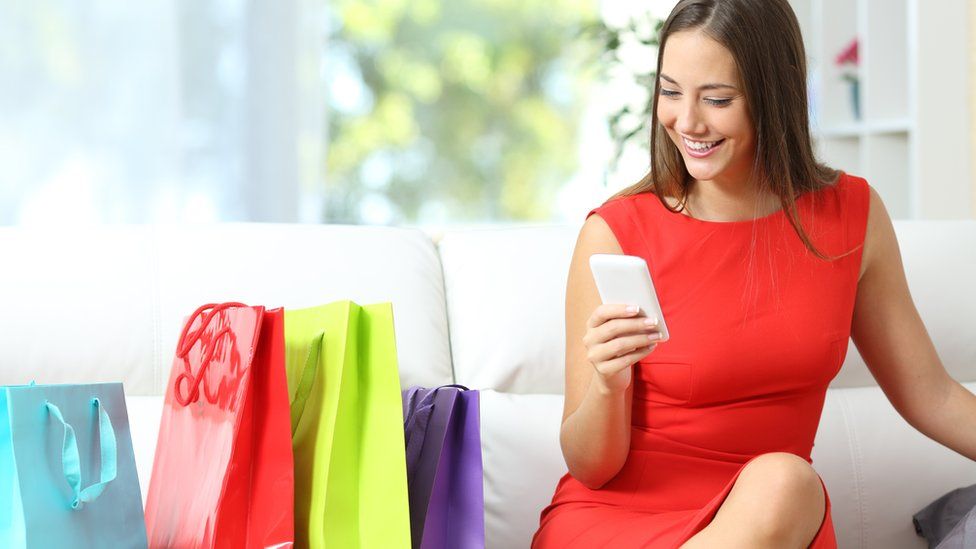Snap, swipe, like: The mobile future of fashion retail
- Published

We use smartphone swipe technology to find a date on Tinder, so can we use it to find the perfect outfit as well?
Tech firm Bijou Commerce believes so. Its platform enables fashion and beauty apps to offer single-image browsing - customers can swipe right if they like a product, and left if they don't.
Working with retail companies like Nobody's Child, Bijou is on a mission to make fashion shopping simpler and more engaging for customers.
"Most retailers' apps and mobile sites put between four and 12 products on a single screen," chief executive Beth Wond tells the BBC.
"These images look small on most mobile phones, meaning individual products struggle to stand out."
She also believes retailers should understand that this Tinder-style swipe technology isn't just a gimmick.
"For fashion brands the biggest asset is your image, so single-image browsing is crucial," she says.
Like it, love it
This is just one example of how fashion retailers are responding to the new world of smartphones and social media.
How about "liking" your way to an outfit choice?
Charese Embree co-founded a US-born site and app called Fynd, a fashion search engine that lets shoppers "like" their way to the look they want.
Say you search for "cocktail dresses" and a wide selection comes up, you can home in on the style and colour you're after by clicking the heart icon on the ones you like. An algorithm narrows down the search for you based on your preferences - "speed dating for dresses" as the website describes it.
"The like button works because of our familiarity with it," says Ms Embree. "Our concept is just an extension of your Facebook or Instagram page, but helps you find that perfect outfit you've been looking for."
Fynd works with department stores such as Bloomingdales to give them the ability to showcase their wares.
"We enable retailers to reach social media-savvy consumers much quicker than they can do in store," she says.
Want it now!
Tammy Smulders, managing director of online fashion platform Luxhub, believes smartphones have made us into impatient buyers.
"We are seeing a shift. It's not that people are more demanding, it's just that the norm is to have everything in an instant," she says.
There has also been a shift from fashion bloggers not just talking about clothes on social media but also giving followers a chance to buy the outfits instantly.
Platforms such as Like To Know It link fashion bloggers' Instagram accounts directly with retailers, so you can shop for the outfits and accessories in the posts you "like".
Luxury fashion group Yoox Net-a-Porter went one step further by creating their own social media app called The Net Set.
"The rise of social media and style blogs has shown that people around the world are inspired by each other's style so The Net Set instantly links consumers, designers and brands in real time," says Alex Alexander, Net-a-Porter's chief information officer.
Video fashion
Watchable social content, such as YouTube, hasn't been forgotten either.
Very, the online clothing brand, teamed up with rappers Rizzle Kicks and former girl band member Rochelle Humes to create the world's first "shoppable" music video.
The music video allowed viewers to click on any item they liked, from the clothes to home wear, and buy it immediately, using Google's TrueView "shoppable ad" functionality.
Jodie Butt at Cake PR, who helped create the video, says: "Today's consumers are digital natives, socially hungry and brand savvy.
"Content is a huge part of their everyday life, but they're are spoilt for choice - which means if a brand can't capture their attention quickly they'll lose them in one click."
The content helped Very take £1.4m in sales as people switched from viewers to shoppers.
And Tammy Smulders believes this is the way we're heading.
"We are moving into a more interactive, real-time way of purchasing goods," she says. "Whether that's taking a picture and purchasing a designer dress at a fashion show or just a cute top we've seen someone wearing on the bus. It's all going to be at our fingertips."
For example, fashion shopping app Goxip in Hong Kong lets fans point their phones at celebrities and buy what they're wearing.
And the UK's Snap Fashion works much the same way - using image recognition software to match up photos you take with the same or similar clothes online or in a high street store near you.
Augmented reality firm Blippar already enables you to point your cameraphone at something and receive information about it. Now it has teamed up with card payments giant Visa and designer Henry Holland to develop the first "instant buy" fashion show.
High street hang up?
But if the fashion industry is being taken over by the smartphone, where does this leave the high street?
Most young shoppers now take their smartphones with them and many use them in-store to research products and compare prices online.
Simon Richards, partnership director at Blippar, says his firm is working with a number of high street stores to take this element of the app further.
"We want to help the high street grow by bridging the gap between the digital and physical worlds and making consumers better informed about the things they see around them."
"By making consumers more knowledgeable about a certain product, such as colour variations, or giving product reviews, it will help the consumer gain more knowledge of the brand or the designer's inspiration behind the collection."
Retailers also gain access to useful data about what their customers are looking at in-store, enabling them to improve stock choices and product placement.
Fashion and phones would appear to be a match made in heaven.
Follow Technology of Business editor @matthew_wall on Twitter